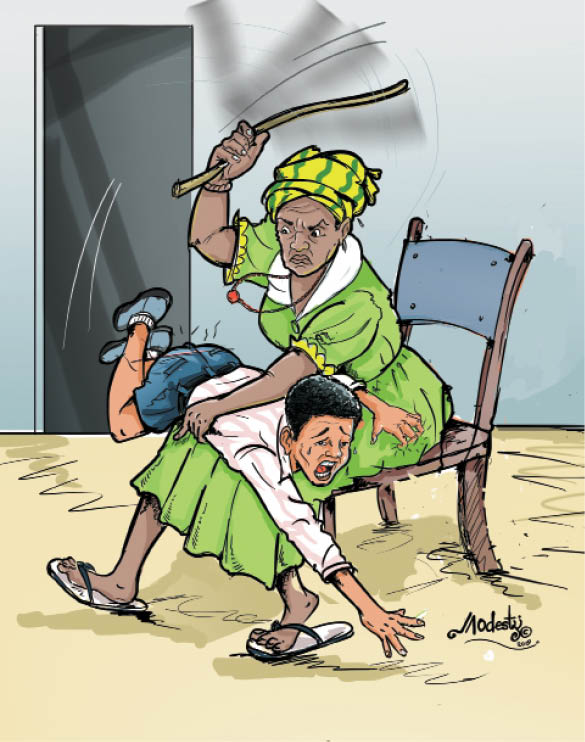Understanding child training without stress
Seven years old Hameed has become used to his mother yelling and beating as a result of his stubbornness. He always returned from school with his uniform soiled, be it normal class day or sport days, unlike his five-year-old sister that would return home neat. He was always punished by his mother but the punishment […]

Seven years old Hameed has become used to his mother yelling and beating as a result of his stubbornness. He always returned from school with his uniform soiled, be it normal class day or sport days, unlike his five-year-old sister that would return home neat. He was always punished by his mother but the punishment didn’t appear to have changed him even a bit.
He is a hyperactive boy, he does not like sitting in one place but loves to play, especially football, but his mother often denies him of that because she wants him to do him homework.
Another six-year-old boy, Olofu David, also receives many strokes of the cane whenever he goes wrong. His mother said although he would always say he will not repeat what he was punished for but she finds him doing it again.
“I don’t want him to get used to the spanking so I give him mild punishment like kneeling down and raising his hands up for some minutes but all seem not to be working. He makes me shout too much, as if I am the only mother in my area. But I cannot ignore his bad attitude, I will not want him to grow up with it,” the worried mum said.
A mother of three boys, Mrs Toyin Oguntade, said when the boys were becoming too difficult to control, she has a way of handling them because she doesn’t want to spank them all the time. “I have a ‘naughty corner’ in the house where I sent anyone who is misbehaving. It is just a matter of sitting there and facing the wall all alone and they don’t like it at all. So it helps to keep them in line. If you beat them, they bounce back after some minutes and you find yourself yelling again.”
Mrs Oguntade said she has discovered that when you heat children in order to correct them, they soon become use to it. They could become hardened instead and that could affect their learning. This, she said, she learnt when they were growing up.
Research has shown that children are born with temperaments and this can be classified into three; easy, slow-to-warm-up, and difficult temperament. Children with difficult temperament are often referred to as “difficult children” and are estimated to be about one in 20 that are often brought to the attention of pediatricians and child psychologists.
Hyperactive children can confuse and upset even experienced parents and teachers thereby making them resort to either punishing or disciplining the child.
The Director, Creativity for Resilience Program at Dell Medical School in Austin, Texas, Carrie Barron, in her book, ‘The Creative Cure’, said some children are hardwired to disturb the peace at home or school but their unusual energies take them to high places later.
She said some children are difficult because of their creative personality, highly sensitive nature, oppositional defiant disorder, learning disability, mood disorder or a sub-clinical phenomenon, adding that naming a problem can be good for clarity and anxiety relief.
Baron said, disruptive, demanding children can become fantastic contributors later in life. “A troublemaker who takes over the classroom may become an energetic CEO. A big personality might become a media mogul. A tearful soul might become a missionary for a meaningful cause. A recluse may become an artist. Some people are not that social because they have a rich inner life.
Healthychildren.org suggests that the best way to handle children with high temperaments is to first, recognise that much of your child’s behavior reflects his temperament and establish a neutral or objective emotional climate in which to deal with the child.
It stated that parents should try not to respond in an emotional and instinctive manner because it will be unproductive. “Temperament is innate, and your child probably is not purposely trying to be difficult or irritating. Don’t blame him or yourself. Try to prioritise the issues and problems surrounding your child. Some are more important and deserve greater attention while others are not as relevant and can either be ignored or put away. Consider your own temperament and behavior and think on how you might need to adjust yourself a bit to encourage a better fit with your child.”
A psychologist and certified Emotional Intelligence, Anger Management and Fear Mastery coach, Mrs Oluwatoyin Ogunkanmi, in her book, ‘Smart Parenting’ stated that, discipline is helping a child solve a problem while punishment is making a child suffer for having a problem.
The psychologist said, the last strategy is to use positive discipline to correct undesirable behaviours, and to reinforce desirable behaviours, adding that parents should use discipline to teach children about expectations, guidelines, family and community rules, values and principles.
“Discipline simply means to teach. Your child learns self-control, self-confidence and self-esteem when you teach him or her because you are the first teacher and role model of your child. It involves setting rules and regulations, and also by establishing boundaries for them.”
She said there is no difficult child but that it is the parents that have not understood and when you use physical punishment, children are more likely to have challenging behaviour, anxiety or depression. There’s also a risk that smacking might hurt your child.
Mrs Ogunkanmi said instead of punishing a child for an offence, parents should adopt the use of positive discipline which is not about inflicting physical or emotional harm on the child but teaches important social and life skills in a manner that is deeply respective and encouraging, for both children and adults. “It simply means you respect, listen and reward good behaviour with love.”
